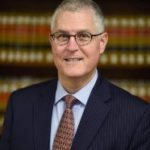The next episode of The Score will feature an interview with John Q. Barrett, a professor of law [1] at St. John’s University in New York, which is mostly about the President’s declaration of a state of emergency at the southern border and how that might be affected by the Supreme Court’s 1952 ruling in Youngstown Sheet & Tube Company v. Sawyer [2], which included a famous concurring opinion [3] by Justice Robert Jackson, who had also served as Franklin Roosevelt’s attorney general.
 As it happens, Barrett is an expert on the life and career of Justice Jackson (who also was the chief U.S. prosecutor at the Nuremberg war crimes trials after the Second World War). He is the editor of That Man: An Insider’s Portrait of Franklin D. Roosevelt [4], a collection of Jackson’s writings, and author of entries about Jackson in the World Book Encyclopedia and The Yale Biographical Dictionary of American Law [5].
As it happens, Barrett is an expert on the life and career of Justice Jackson (who also was the chief U.S. prosecutor at the Nuremberg war crimes trials after the Second World War). He is the editor of That Man: An Insider’s Portrait of Franklin D. Roosevelt [4], a collection of Jackson’s writings, and author of entries about Jackson in the World Book Encyclopedia and The Yale Biographical Dictionary of American Law [5].
As our conversation about presidential emergency authority was about to end, I asked him about another well-known opinion by Jackson [6], written for the Supreme Court in 1943. The case, West Virginia Board of Education v. Barnette, affirmed the rights of Americans to refuse to recite the Pledge of Allegiance, even if government authorities — in this case, a school — try to require it.
My question was prompted by another case that made headlines this week, such as this one from USA Today [7]: “Florida student faces misdemeanor charges after refusing to stand for Pledge of Allegiance.” Despite more than 75 years of unequivocal jurisprudence, it seems that, too often, local officials try to force unwilling citizens to profess their loyalty in public.
Professor Barrett gave this brief reply to my question:
http://bearingdrift.com/wp-content/uploads/JQBarrett-Feb19-2019-excerpt.wav [8]I don’t know the ins and outs of the Florida case but generally Barnette, overwhelmingly reaffirmed by many subsequent courts, was a decision in the throes of World War II, that recognize the First Amendment rights of Jehovah’s Witness schoolchildren to refuse, on religious scruples, to stand and salute the American flag and pledge allegiance.
Jackson wrote for the Court that, if there’s any fixed star in the constitutional constellation, it’s that officials can’t prescribe what’s orthodox and compel people to state their belief therein.
I think what happens is that these First Amendment principles are well known in the upper echelons but sometimes the school district doesn’t include a memorandum or regular training in the packet every year for teachers. I think it sounds like a quite plain Barnette violation. But in the meantime, the student’s exercise of conscience was regulated and punished and that’s not consistent with the Constitution….
Profession of patriotism, Jackson wrote, is most meaningful when it’s a free act. When it’s compelled that is the antithesis of what it proclaims.
In the interest of full disclosure, I should note that John Barrett and I were on the debate team [9] at Marquette University High School in Milwaukee and we attended Georgetown University at the same time, as well.
There will be more newsworthy interviews on The Score this week [10]. I already have scheduled conversations with Ilya Shapiro of the Cato Institute and Daniel Di Martino, a Venezuelan emigre whose USA Today opinion piece [11], warning of the dangers of socialism, has brought him a great deal of press attention.
Stay tuned.